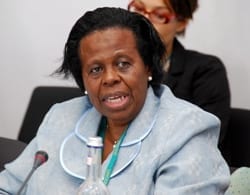“In the protection of our ecosystems we must invest in the most cost-effective ways with regards to human capital development and finance. To this end I would like to stress that nations that share ecosystems, such as international waters, can most effectively plan for their management if they have common regional agendas,” said deputy minister of Water & Environmental Affairs, Rejoice Mabudafhasi, on the occasion of the launch of the Global Environment Facility International Waters Science Conference at the United Nations Conference Centre in Bangkok Thailand.
The conference, which aims to “set the International Waters Science Agenda for the next decade”, is a science conference for practitioners and academics to provide leadership in finding solutions for the Earth’s most pressing transboundary waters challenges. It took place from 24 to 26 September. Although gratified to address the conference, Mabudafhasi said that in order to have effective common regional agendas, the agendas needed to be informed by common databases, management plans and common indicators, which could then inform the local plans. “There should be a clear definition of how these indicators and thresholds will be monitored by individual countries beyond the lifespan of any particular research project. These indicators must be as efficient as possible and provide knowledge that allows us to make environmental interventions at regional, national and community levels. Importantly, there needs to be clear linkages that demonstrate the contribution that local and national interventions have towards regional or ecosystem objectives,” explained Mabudafhasi.According to Mabudafhasi, the deliberations needed to be focused on, among others, regional cooperation and sharing of information, investment in human capital and technology, and enhanced community participation and the utilisation of indigenous knowledge in the management of ecosystems.
In closing, Mabudafhasi emphasised that communities could not be excluded from the decision-making processes involved and that research and science must not only inform, but also support policy implementation. “We need to ensure that the research results are communicated to all stakeholders involved, including communities.”






